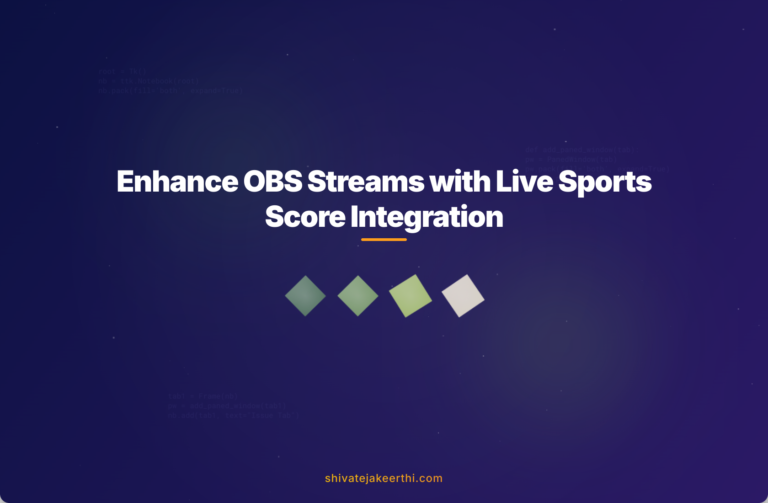Live streaming sports events can greatly benefit from dynamic and interactive elements. One of the most engaging features to include in your OBS live streams is a live sports scores script that pulls and displays real-time data directly on your broadcast. Adding real-time scores not only boosts viewer engagement but also brings a professional feel to your live sports coverage. But how exactly do you set this up?
Understanding OBS: Your Go-To Streaming Tool
OBS, short for Open Broadcaster Software, is an open-source streaming and recording program widely used for broadcasting live events, video game streaming, and webinars. It’s free, powerful, and customizable, making it popular among content creators, gamers, and professional broadcasters alike.
With OBS, you can layer multiple video sources, images, text elements, and interactive graphics. Its versatility allows streamers to enhance their broadcasts with real-time information, like live sports scores or game statistics, providing a dynamic experience for viewers.
What Exactly is a Live Sports Scores Script?
Simply put, a live sports scores script is a custom program (usually written in JavaScript or Python) designed to fetch current sports scores from online feeds or APIs and render them visually within a broadcast environment like OBS. Using such a script, content creators can display up-to-date scoring information without manual input.
Imagine you’re streaming a basketball game event. Instead of manually updating every time a basket is scored, your score graphics update themselves automatically, leaving you free to engage more with your audience.
Why You Should Use a Live Scores Script in OBS
Integrating a live sports script offers multiple benefits:
- Real-time Updates: Automatically updated scores mean zero delays, ensuring viewers receive constant and accurate game information.
- Viewer Engagement: Fans love staying updated in real-time. Interactive features like updated scores encourage viewers to stay tuned longer and interact more actively with your stream.
- Visual Appeal: Professionally presented score updates improve the aesthetics and quality of your stream, setting your content apart from others.
Finding Reliable Data Sources for Sports Scores
Getting live sports data is key to your script’s success. Numerous online data providers offer APIs (Application Programming Interfaces) specifically tailored for streaming current score data. A few popular sports score APIs include:
If you’re hosting smaller, localized events that may not be covered by public API, creating your own custom data source (like a Google Sheets document or JSON file) is also a practical option.
Setting Up Your Script to Pull Live Sports Scores
To pull live sports scores into OBS, follow these simple steps:
- Select and subscribe or sign up to an appropriate live sports API.
- Obtain your personal API key (usually provided after registration).
- Choose the scripting language: JavaScript or Python often work best.
- Fetch data regularly, parsing JSON data into readable text format with your script.
- Output the parsed data to a text file, JSON file, or directly via a local web server.
For instance, here’s a simple JavaScript snippet to pull JSON data using the Fetch API:
fetch('YOUR_API_URL', {
headers: {'API-Key': 'YOUR_API_KEY'}
})
.then(response => response.json())
.then(data => {
// Example for soccer game
const homeTeamScore = data.response[0].scores.home;
const awayTeamScore = data.response[0].scores.away;
document.getElementById('score-box').innerHTML = `${homeTeamScore} - ${awayTeamScore}`;
})
.catch(error => console.error('Error:', error));
Remember, you might need minor modifications depending on your API specifications. If you’re new to JavaScript, check out our JavaScript tutorials for deeper understanding and extra tips.
Formatting and Displaying Scores in OBS
Once you retrieve the live score data, the next step is displaying it neatly in your OBS scene. OBS easily captures data from browser sources or text files.
For browser-based displays:
- Create a local HTML page styled with CSS for your scoreboard.
- Use JavaScript to periodically refresh and update this HTML page with the latest data fetched.
- Add a “Browser Source” in OBS and link it to your local HTML page.
To customize your display appearance, try different font sizes, colors, logos, and transitions to match your branding. You can even create animations if you’re confident with CSS transitions or animation libraries such as GSAP.
Best Practices for Seamless Score Script Integration
To avoid common pitfalls, consider these practical tips:
- Enable caching: Don’t overload your API by requesting data too frequently. Balance refresh intervals (e.g., every 15 seconds).
- Error handling: Always prepare fallback visuals in your layout. In case API data cannot load temporarily, display friendly messages instead of blank areas.
- Test before live: Thoroughly test your setup, scripts, and data integration before official broadcasts to prevent glitches.
- Keep visuals simple: Ensure score graphics remain easily readable even on small mobile screens.
Real-world Examples of OBS Live Sports Scores
Many streamers and content creators successfully implement real-time scores. Twitch sports broadcasts, YouTube game highlight streams, esports competitions, and local broadcasters widely benefit from live data overlays.
For example, prominent esports stream productions integrate APIs directly into OBS overlays, providing real-time score updates without manual host intervention—allowing immersive viewer interactions.
Reflect on major event broadcasts from professional sports—real-time score updates and live statistics significantly boost professionalism and viewer retention.
Displaying live score data adds authenticity, and the streamlined process enables a one-person team or small crew doing professional-level sports streams.
In today’s ultra-competitive content creation field, interactive and real-time data displays aren’t just perks—they’re necessities. OBS combined with JavaScript, live APIs, and thoughtful score presentations has made that job simpler.
Ready to upgrade your sports broadcasts with real-time scores? Why not give a live scores script integration a try in your next OBS stream? Your viewers—and your stream quality—will appreciate the difference.



0 Comments